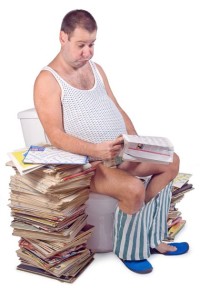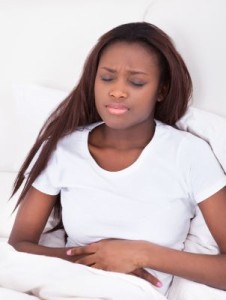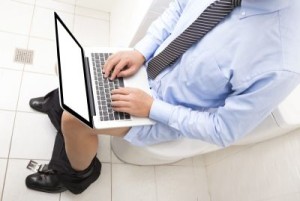Constipation and IBS Guide

© Can Stock Photo
What it is – What causes it – What to do about it
Chronic constipation is like regular constipation, but it keeps coming back. We’ll look at some of the reasons why in the causes section.
First let’s have a look at what you’ve been dealing with.
Constipation Symptoms

© Bigstockphoto.com
Okay first you get all the regular constipation symptoms:
- Straining during a bowel movement
- Bloating
- Gas
- Weakness
- Low energy
- Abdominal discomfort
- Feeling like you didn’t get it all out (a feeling of incomplete evacuation)
If you get weak, tired, or feel faint also see: Abdominal Pain and Fatigue
Constipation and IBS
With IBS You’ll get some or all of the symptoms above, plus:
Abdominal pain from cramps and bowel spasm,
And…
Two or more of the following:
- Problems improve when after you defecate (also known as poop).
- Changes in how often you can defecate.
- Hard lumpy stool, that’s hard to get out.
What Causes Constipation?
Constipation happens when stool (or feces, or poop) moves too slowly through the large intestine.
The large intestine absorbs the water (part of it’s job) leaving a hard, lumpy stool that’s difficult to pass.
There are many things that can cause constipation. I’ve listed the most common ones below.
What Causes Chronic Constipation?
Any of the following items that are a regular part of your life may lead to chronic constipation.
Of course, I’m assuming you’ve been to the doctor to rule out something serious.
Sorry, just a friendly reminder. I care :).
So, here are some of the main causes of constipation:
IBS and Constipation

© Can Stock Photo
If you HAVE been to the doctor, and he or she didn’t find anything medically wrong with your bowels, you probably got an IBS diagnosis.
Here is the current theory on how IBS causes constipation:
The large intestine moves stool along by a rhythmic squeezing known as peristalsis.
Bowel spasms, (like painful muscle cramps) in the large intestine can trap stool and gas.
The stool gets hard as the water is absorbed into the large intestine, making it harder to move.
This causes pain and more cramping as your bowels struggle to move the hard dry stool. This can continue in a vicious cycle.
Lifestyle
Our modern lifestyle of too much fat, too little fiber and for many of us, too little exercise (the dreaded E word) just about guarantees an occasional bout of constipation.
But with chronic constipation, the picture is a little more complicated.
Foods That Cause Constipation
Many foods in the modern diet are high fat and low fiber. Your bowels need fiber to move the food through your digestive tract. Here are some other dietary items that can cause constipation.
Fats – Fats can make matters worse by giving the intestines even less to grab on to. Fats can cause bowel spasms in people with IBS, which leads to abdominal pain, and constipation (or diarrhea).
Dairy Products – Eating large amounts of dairy products can cause constipation. My mother always said cheese was “binding.”
Dehydration – Having enough liquids (preferably water) can help keep things moving. Without enough water, things can come grinding to a halt inside.
Caffeine and Alcohol – Both of these can contribute to dehydration. For people with IBS, alcohol or caffeine can cause bowel spasms, pain, constipation or diarrhea.
Medicines That Cause Constipation
Lots of medications can cause constipation. If you regularly take medication, you should find out if constipation is one of the side effects.
Here are some well known ones:
Narcotic Pain Medications

© Can Stock Photo
These kinds of medications can make your bowels sluggish. Here are some of the common ones:
- Codeine
- Oxycodone
- Dilaudid
- Etc.
Antidepressants
Such as: Elavil or Imiprimine, and others.
Stimulant Laxatives
Some people in the medical community believe that stimulant laxatives can actually damage the colon.
Others believe that certain laxatives can weaken the colon.
Either way most experts recommend that stimulant laxatives be used as a last resort (or as directed by your medical professional).
How is Constipation Treated?
This is a large topic which I’ll talk about elsewhere. But the short answer is:
Changes in Diet – Increased fiber from vegetables, fruits and beans can be a huge help. Also reducing meat, dairy and processed foods.
Lifestyle Changes – Drinking more water, and less caffeine helps prevent dehydration.
Getting regular exercise – especially abdominal exercise stimulates the bowels and helps keep things moving.
Learning to de-stress and relax – People sometimes use the expression “my stomach is tied up in knots” when they are nervous, worried or anxious. It’s actually their bowels that are “tied in knots.”
Learning to relax can help keep your bowels from cramping up. That can help prevent constipation.
Medicines and Dietary Supplements
Supplements such as peppermint oil capsules, osmotics or stool softeners can help ease constipation. There are also some medications your doctor can recommend.
More info coming soon!
Can Chronic Constipation Cause Other Problems?

© Bigstockphoto.com
Though serious problems from typical constipation are rare, there can be some complications from chronic constipation.
Straining to have a bowel movement can cause some problems, such as:
Anal fissures – Hard stool can stretch or tear the skin around your anus. This can cause a small amount of bleeding (red streaks on the stool).
Rectal prolapse – When some of the intestine comes out through the anus because of all the straining.
Hemorrhoids or piles – These can occur from straining. Hemorrhoids are bulging veins on or around the rectum.
Amazingly, to three quarters of all people in developed nations develop hemorrhoids.
Impaction – When the stool gets so hard it won’t come out of the rectum. Then either mineral oil taken by mouth, or an enema (up the other end) are used to soften the stool.
The doctor may then clean it out with fingers (Sorry, I thought you should know :).
Return to the Homepage from Chronic Constipation
5 Replies to “Constipation and IBS Guide”
I do everything right and still have bloating and constipation. ????? Water ,vegetables no cheese no caffeine no alcohol heaps of exercise. Cardiovascular and pilates. Dr gave me Colefac pills but haven’t eaten today and bloated out in morn first thing….??? Nothing medicaly wrong detected….Ms Agony.
I am never constipated . I Recently started drinking “green” smoothies” . I put in spinach, leafy greens berries, and tofu and water. I drink this each morning and then usually have soup for lunch and then lean meat and veggies and salad. I exec rise almost every day (yoga, walking, dancing,) Snce I started the smoothies I have had severe constation. Does this make sense?
Hope this reaches you.
First of all, your smoothies are great and certainly can be a valuable introduction to your diet.
Nevertheless, it is not uncommon for individuals who switch to a more liquid diet to experience constipation – it is mainly related to the physiology of peristalsis of your GI tract. The basic principle denotes that solid food (the act of chewing, swallowing and stomach churning) stimulates GI motility across the whole tract and without such stimuli, the body simply does not understand whether to get things moving. As your gut is most sensitive to this in the morning, I would suggest a solid-food breakfast (with some form of protein, as it is a good peristalsis stimulus) which then can be followed by your smoothies and soup.
In addition, you haven’t mentioned any fat-intake in your diet which is essential to get things moving – olive oil with salads, an occasional avocado, salmon or any other fatty fish (2x a week), nuts and seeds (preferably soaked to favor digestion) with salads and things should be moving in no time!
Hi, please tell me how I can stay regular Naturally. I never have diarrhea even if I take laxatives which I don’t want to do for the rest of my life! sorry very frustrated here. right now I eat a 10grm fiber cereal in am., eat 6 stewed prunes a day, 2 Tbls. magnesium powder, drink a gallon of water a day (I pee a lot)so I don’t think my bowels are absorbing it. I don’t eat red meat. I have a big salad once a day. then fish veggies n brown rice at night”Smooth Move” laxative tea not working anymore. nor does 2 chocolate laxative squares(3 work) but this isn’t healthy… now I am incorporating Xylitol in my diet because I heard it gave people diarrhea when in coffee. I do drink a cup of coffee in the morning with real cream…is this messing me up? I don’t know what else to do. when I got severely impacted the doctor gave me Dilaudid and sent me home. I spent three days on my knees in dire pain. wrong thing to give me, now I don’t trust doctors. please help, Lisa
Hello Lisa, I’m sorry you’re having so much trouble. That sounds horrible! I can’t give medical advice, but I can tell you what I think. Too much can be as bad as not enough. If you’re getting cramping in your bowels, I’ve read that it can cause things to stop moving. It sounds like you’re doing a lot of clever things though.
I’ve read that sometimes coffee can cause bowel cramping, but it’s usually more likely to cause diarrhea. Some laxatives seem to work by irritating the bowel. That may be a problem for you.
Cheese and dairy can be very “binding” as my mother used to say (God rest her).
Aerobic excercise is REALLY supposed to help. I would think something that works the abdomen would be especially useful. (I say that though I’m too lazy to do it myself so far).
A different doctor (maybe a naturopath) might be in order.
Some people have used acupuncture and found some relief.
Many people are helped by hypnosis, but you have to watch for quacks.
There is something called slippery elm, which I’ve used to soothe irritable bowels. It’s name might be a hint for you. It’s a health food store item, or an online item.
I’m afraid to tell you to stop anything you’re doing, because I don’t want to cause you any more trouble.
I have links to a lot of this on this site.
I don’t have IBS-C., but if I did, I’d cut back on the laxatives (carefully and slowly), I’d try a different doctor, probably a naturopath, and/or I’d see an acupuncturist (I’ve been helped in other ways by acupuncture.).
I hope something you see here helps. Please let all of us know how you make out. – Stay hopeful if you can. Shawn